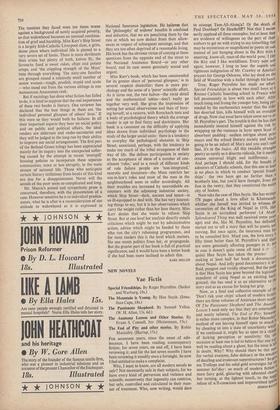NEW NOVELS
Vae Fictis
The Anatomy Lesson and Other Stories. By Evans S. Connell, Jnr. (Heinemann, 15s.) The End of Pity and other stories. By Robie Macauley. (Harrap, 15s.) FOR seventeen years, since the onset of ado- lescence, I have been reading contemporary fiction; for seven years, on and off, I have been reviewing it; and for the last seven months I have been reviewing it steadily once a fortnight. So now I feel entitled to make a complaint.
Why, I want to know, are all modern novels so safe? Not necessarily safe in their subjects, for we have every kind of perversion and violence and scientific monstrosity that ingenuity can contrive, but safe, controlled and calculated in their man- ner of treatment. Who, now writing, would dare to attempt Tom-All-Alone:0 Or the death of Paul Dombey? Or Heathcliff? Wot that I neces- sarily applaud all these examples; but at least they are evidence of willingness on the part of their authors to get on with trying to say something that
may be mysterious or magnificent or poetic or sad, instead of just hanging about in the Ritz with a sneering, know-all, man-of-the-world pose. I like the Ritz and I like worldliness. Every now and again, however, I long to hear the superb and righteous indignation of Mr. Crawley or Amelia's prayers for George Osborne, who lay dead on the field of Waterloo with a bullet through his heart. True, Roger Peyrefitte has made an effort. Special Friendships is about two small boys at a Roman Catholic boarding school in France who fall passionately in love with each other. After much toing and froing the younger boy, being per' suaded by the mathematics master that the elder has deserted him, kills himself with an overdose of drugs. Now that must have taken some nerve on M. Peyrefitte's part. The trouble is that he has then immediately insured himself against the risk by wrapping up the romance in layer upon layer of absorbent padding: endless intrigue about prize essays and the school literary society and who's going to be an infant of Mary and you can't read that, it's in the Index. All this twaddle strangles poetry as surely as it disarms ridicule, for it merely creates universal blight and indifference.. • And perhaps I should add, for the benefit 01 admirers of Catholic schools, that this one at least is no place in which to conduct 'special friend' ships' : the two boys get no farther than a brotherly kiss, but you'd have thought, from the fuss in the vestry, that they constituted the entire city of Sodom. Now take the case of Han Suyin. She has written 578 pages about a love affair in Khatmanda, whither she herself was invited to witness the coronation of the King of Nepal in 1956. Han Suyin is an accredited performer (A Mae Splendoured Thing was well received some years ago) and she, like M. Peyrefitte, has definitelY, started out to tell a story that will be poetic and moving. But once again, the insurance man has to be consulted first. Mind you, the love story is fifty times better than M. Peyrefitte's and there are some genuinely affecting passages in it: but in case it doesn't quite come off (and it d quite) Han Suyin has taken the precau' making at least half her book a documemarY about Nepal. And jolty good documentary it is'', fluid, pungent and vividly observed. But the pole' is that Han Suyin has gone beyond the legitimate expedient of using Nepal as an exciting beet(' ground; she has used it as an alternative to the story and as an excuse for losing her grip. Now, as a final and collective example of the 'Don't risk your chips' school of modern fiction' there are three volumes of American short stories' Of The Passionate Shepherd and The Anatal,' Lesson I need only say that they are entertaining and neatly tailored. The End of Pity, howevcf; is rather more complex, in that Robie Macauley,' , method of not leaving himself open to attack P by cheating us into a state of uncertainty whicil; if we confessed it, might lay us open to a charg: of lacking perception or sensitivity. On one occasion at least one is led to believe that one rel well be reading about a ghost, but the issue is left in doubt. Why? Why should there be this nee,, for verbal evasions, false delicacy or the erection of dazzling and irrelevant superstructures? So give , me Trollope and his solid gold sovereigns for 011 summer haiday : so much of modern fiction 15 mere fairy gold, glittering with educated charill,' but turning, at the lightest touch, to the sog.g? refuse of se If-conscious and impoverished spirl_it'
SIMON RAVr"












































 Previous page
Previous page